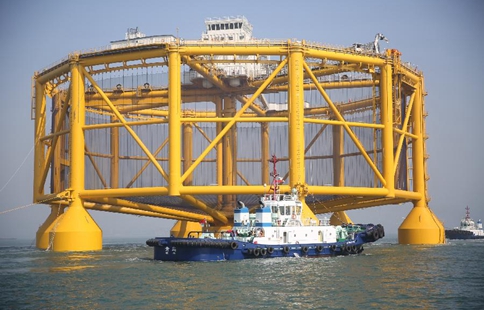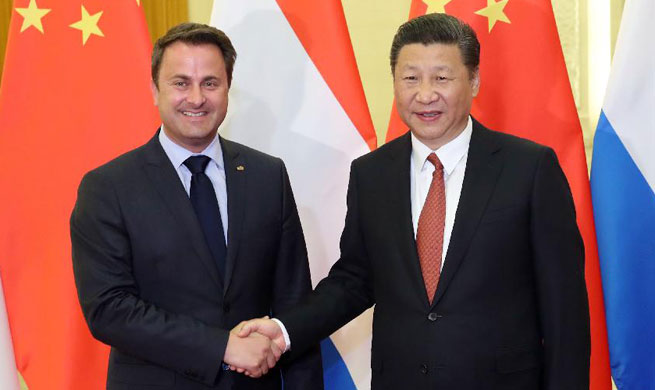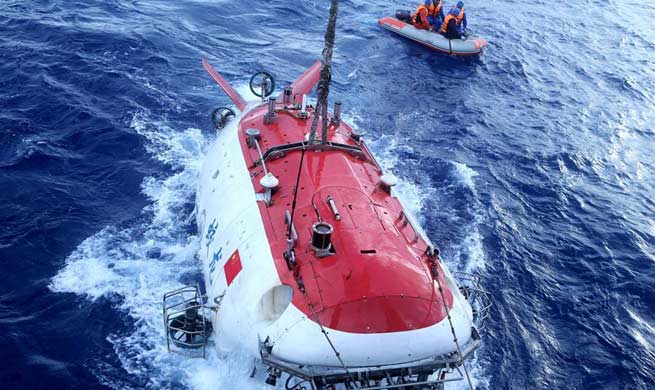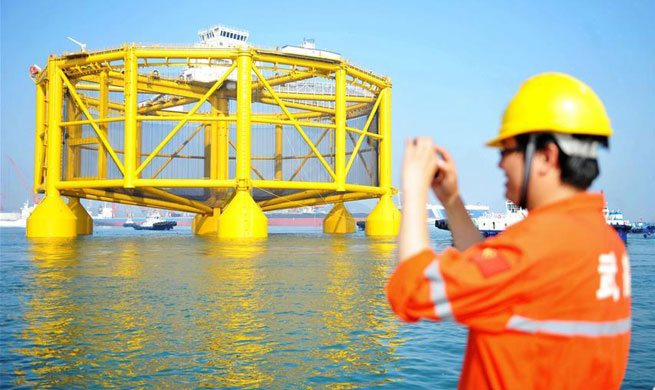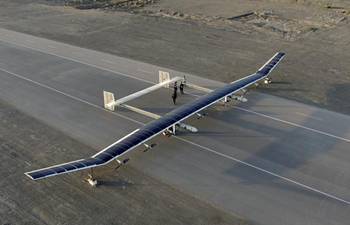BERLIN, June 14 (Xinhua) -- The German Minister for Economics Brigitte Zypries (SPD) will reveal on Wednesday in the federal cabinet that German arms exports fell by 13 percent in 2016.
According to the arms exports report obtained by German newspapers Handelsblatt and Bild, the German government approved international arms sales of domestic manufacturers with a total value of 6.85 billion euros (7.71 billion U.S. dollars) last year compared to 7.86 billion in 2015.
While remaining on a high absolute level, the figures point to a trajectory of decline. A total of 46.6 percent of exports went to German-allied European Union (EU) and NATO member states.
Under the restrictive regulations enshrined in the German constitution, the export of military technology is a privilege for which the country's arms manufacturers must seek permission.
Preliminary figures suggest that arms exports also fell in the first four months of the year from 3.3 billion euros in 2016 to 2.42 billion euros in 2017.
Bucking the larger trend, exports in the category of "war arms" rose by a value of roughly one billion to 2.5 billion euros between 2015 and 2016, the Bild reports.
German law distinguishes between "war arms, small arms and light weapons" including tanks automatic firearms, and "other arms" such as surveillance drones and helmets.
In practice, however, the line of division in the categorization of military technology is often blurred.
In the war arms subcategory, sales to states which were not EU, NATO or other equivalent partners rose sharply from a total value of 1.17 billion euros in 2015 to 2.3 billion euros in 2017.
Three countries, Algeria (887.6 million euros) Qatar (790.5 million euros) and South Korea (356.5 million euros), accounted for 90 percent of this figure.
Arms exports are a long-standing subject of political controversy in Germany.
The Social Democrats (SPD) in particular, which form part of the ruling "Grand Coalition" under chancellor Angela Merkel (CDU), have long advocated for more restrictive legislation and fewer export permissions.
Following in the footsteps of her predecessor Sigmar Gabriel (SPD), Federal Minister for Economics Brigitte Zypries (SPD) has voiced concern over potential human rights infringement and hence sought to reduce the number of arms sales to nations which are not EU or NATO allies.
While the dependence of German arms manufacturers on so-called third countries remains high for large-scale contracts, Zypries can claim as at least a partial success that exports to EU/ NATO states rose by more than five percent between 2015 and 2016.
The report further pointed out annual arms sales to third countries of 3.67 billion euros were heavily influenced by a small number of high-value orders.
The delivery of a single frigate to the Algerian navy alone accounted for nearly two thirds of the value of all exports to third countries, according to the Handelsblatt.
Exports of the subcategory of "small arms and light weapons" (SALW) witnessed a significant relative increase in the first four months of 2017 to 22.1 million euros from 4.4 million last year.
The German government stressed what it views as its "restrictive and transparent" policies with regards to arms exports in the report.
In addition to stricter supervision of the final location of arms, officials held consultations about the future of the German arms industry with religious organizations, NGOs and scientists for the first time this year.
Foreign Minister and Vice Chancellor Sigmar Gabriel (SPD) raised the possibility of involving the German federal parliament (Bundestag) in the approval process for arms exports.
"There is no need for secrecy," Gabriel told the press.
The Federal Security Council, made up of Chancellor Merkel, Vice Chancellor Gabriel and seven other cabinet members, currently makes arms sales decisions. Enditemy of "war arms" rose by a value of roughly one billion to 2.5 billion euros between 2015 and 2016, the Bild reports.
German law distinguishes between "war arms, small arms and light weapons" including tanks automatic firearms, and "other arms" such as surveillance drones and helmets.
In practice, however, the line of division in the categorization of military technology is often blurred.
In the war arms subcategory, sales to states which were not EU, NATO or other equivalent partners rose sharply from a total value of 1.17 billion euros in 2015 to 2.3 in 2017.
Three countries, Algeria (887.6 million euros) Qatar (790.5 million euros) and South Korea (356.5 million euros), accounted for 90 percent of this figure.
Arms exports are a long-standing subject of political controversy in Germany.
The Social Democrats (SPD) in particular, which form part of the ruling "Grand Coalition" under chancellor Angela Merkel (CDU), have long advocated for more restrictive legislation and fewer export permissions.
Following in the footsteps of her predecessor Sigmar Gabriel (SPD), Federal Minister for Economics Brigitte Zypries (SPD) has voiced concern over potential human rights infringement and hence sought to reduce the number of arms sales to nations which are not EU or NATO allies.
While the dependence of German arms manufacturers on so-called third countries remains high for large-scale contracts, Zypries can claim as at least a partial success that exports to EU/ NATO states rose by more than five percent between 2015 and 2016.
The report further pointed out annual arms sales to third countries of 3.67 billion euros were heavily influenced by a small number of high-value orders.
The delivery of a single frigate to the Algerian navy alone accounted for nearly two thirds of the value of all exports to third countries, according to the Handelsblatt.
Exports of the subcategory of "small arms and light weapons" (SALW) witnessed a significant relative increase in the first four months of 2017 to 22.1 million euros from 4.4 million last year.
The German government stressed what it views as its "restrictive and transparent" policies with regards to arms exports in the report.
In addition to stricter supervision of the final location of arms, officials held consultations about the future of the German arms industry with religious organizations, NGOs and scientists for the first time this year.
Foreign Minister and Vice Chancellor Sigmar Gabriel (SPD) raised the possibility of involving the German federal parliament (Bundestag) in the approval process for arms exports.
"There is no need for secrecy," Gabriel told the press.
The Federal Security Council, made up of Chancellor Merkel, Vice Chancellor Gabriel and seven other cabinet members, currently makes arms sales decisions. (1 Euro = 1.12 U.S. dollars)








